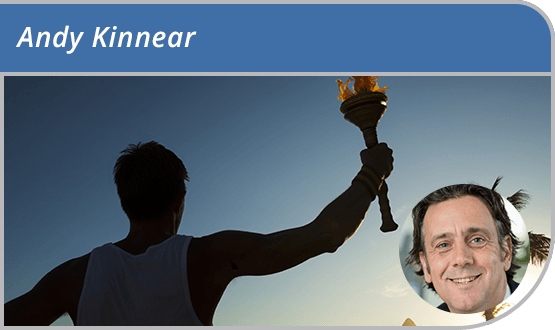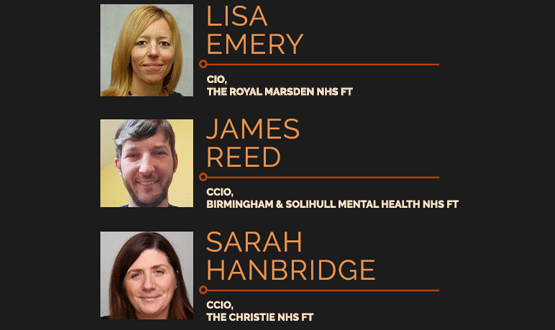Andy Kinnear: one day, will we all deserve a medal?
- 2 September 2016

I am writing this as I watch the Olympics in Rio. What an amazing few days of British sporting success.
Mo Farah, Andy Murray, Justin Rose have all picked up golds in the last few days, and the amazing cycling couple, Jason Kenny and Laura Trott have picked up their 6th and 4th golds, respectively. But two other moments have really stood out for me.
The first was Sophie Hitchon’s bronze medal in the hammer throwing. The look of sheer delight on her face when she realised it had all come together at precisely the right moment; that she had broken a British record and won an Olympic medal to boot.
The interview in which she broke down with emotion describing the support of her coach and her family immediately afterwards. It was really touching. It was truly beautiful.
Now, I don’t know much about hammer throwing, but I do know that it’s not a sport you take up to make millions, or receive huge media attention, or even stand out in the world of athletics. I am guessing you do it because you love it and one day you might go to the Olympics. It is that simple.
The second was the men’s double badminton bronze for Marcus Ellis and Chris Langridge. I have to declare an interest here, I love badminton, I have played for years and years and think it is a fantastically exciting sport.
So I am biased. But what I loved about Chris and Marcus was the comments they made after their wins. They were humble, they said things like: “We are not the best badminton players in the world, but we work very, very hard”.
They too talked a lot about the sacrifices they had made to realise their dream, about the support they received from their family and coaches, and about the way lottery funding had underpinned their success.
A national framework of support
When your mind works in the way mine does, then you start drawing comparisons between the world of sport these folks live in, and the world of digital health and care I enjoy.
I found myself comparing my own career to theirs and trying to decide if I had even done enough to make the metaphorical digital health team to Rio. Maybe not, but I found myself finding parallels between their world and ours.
For starters, our athletes, swimmers, cyclists and so on are the beneficiaries of a national framework designed to support their success.
The decision to fund full time sportsmen and women with lottery funding is truly inspired, the work of UK sport and the various sporting bodies to create the environment for success is truly world class.
In digital health, we are much closer to the start of our journey, but in the national strategy we now have, in the leadership at national level, in the formation of NHS Digital, and in the funding secured for us by NHS England we have the beginning of a parallel ‘national framework’. Imagine where this could take us.
Supporting people
Secondly, it is common for our successful Olympic heroes to talk emotionally about the people who have supported them. They talk about the national coach or the physio team, or the equipment specialists and are full of gratitude for the support they receive.
Each success might be enjoyed by an individual but it is made possible by the work of a huge team behind the scenes. This is true in digital health too. I have said for years that as a chief information officer, it is a privilege and honour to walk on the shoulders of giants.
The team that supports me in realising the vision I have for a digital health and care future are phenomenal. These unsung heroes put in the hard yards day in and day out. Without them, the high minded ambitions those of in leadership positions espouse are nothing, they are simply words.
I am sure that UK sport and its partners truly recognise the role of their equivalent heroes and support them in every way they can. Our job in digital health has to be likewise, we have to find ways to help these people succeed for all our sakes. This means investing in their futures, their development, rewarding them properly and constantly recognising that without them we are nothing.
Pushing to realise a dream
The last parallel I have drawn is around dreams and the willingness to push and push and push to realise those dreams. Chris Langridge said: “From the age of ten, I have been dreaming of an Olympic medal, and now we have done it. It is insane.”
Chris is 31 years old, and has spent more than 20 years pursuing a dream. He has not done it for money or glory, there is little of that in badminton, but he has done it for himself, for the love of his sport. In the years ahead he will inspire the next generation of badminton players. He will sit down with his grandchildren one day and tell them his Olympic story.
It is not too cheesy to say that those of who believe in a digital health and care system are pursuing a dream, too. Like Chris, we have spent years trying to realise that dream and have years ahead of us. But like Chris we won’t give up, because one day this dream will be reality and it will be us inspiring the next generation of digital leaders.
One day I’ll tell my grandchildren my digital health and care story. I doubt it will be as exciting and glamourous as an Olympic medal winning tale from Rio 2016, but I want to be proud to tell it. Why don’t we all aim to have a moment in our futures where we look back at what we have achieved and think: “I deserve a medal for that!!”




